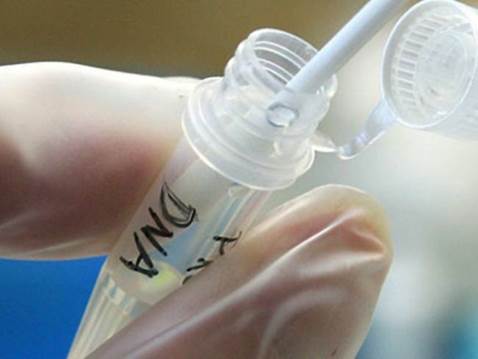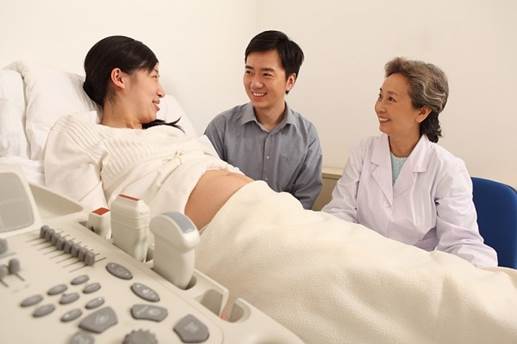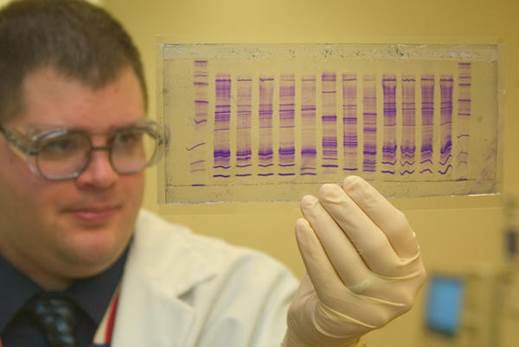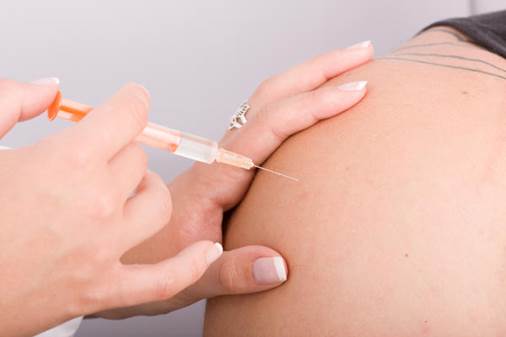The followings are 6 most important tests in
pregnancy and reasons why you need to carry them. Take a deep look to have
clever decisions.
Test that needs carrying before getting pregnant – Genetic
screening
The genetic test is taken before getting
pregnant, but it can be taken in the first antenatal visits which are in about
8 weeks or longer.
Genetic screening is carried out to detect
some genetic disorders of parents, define whether they are dangerous or not.
Although parents don’t have diseases, it doesn’t mean they don’t carry a kind
of disease gene that can transmit to their children.
The screenings are carried by saliva or
blood tests.

Genetic
screening is carried out to detect some genetic disorders of parents, define
whether they are dangerous or not.
On the first date – Rubella immunity test
Rubella is an infection caused by viruses
which belong to the Rubivirus group. Rubella is also called German measles or
3-day measles because it just lasts for 3 days. Rubella virus has effects on
fetal development and is able to cause stillbirth, miscarriage, premature birth
or birth defects. This disease is particularly dangerous when pregnant women
who are infected with acute Rubella in the 13th week of pregnancy.
The virus can go through the placenta and
cause congenital Rubella syndrome including defects to eyes (cataracts), ears
(deafness), cardiovascular and brain (microcephaly), cause splenomegaly,
meningitis… The severity of defects depends on the age that fetuses infected
with viruses. The risk can be up to 90% if the mother is infected with the
viruses in the first 3 months of pregnancy.

Pregnant
women should consider and wisely decide to take medical examination during
pregnancy.
Vaccines that are used for Rubella
prevention are made from Rubella virus that is alive and attenuated. Women at
reproductive age, after being vaccinated against Rubella, are advised to take
contractive methods in 3 months or 1 month at least. Women repair to get
pregnant should take examination to know whether you are immune from the
disease or not. If not, you should get vaccinated.
Besides, pregnant women who aren’t immune
should avoid contacting with Rubella patient. In the case you have contacted
with the patients, you should see a doctor to receive consideration and right
treatment from the doctor. You may have to take examinations during pregnancy
to have diagnoses.
10 weeks – CVS test
The chorionic villus develops earlier then
amniotic fluid so checking its sample can provide valid information about genes
and chromosomes before taking amniocentesis. CVS is a method which is conducted
by chorionic villus.
In obstetrics, CVS aims to early diagnose
fetal defects and is limitedly designate to cases that have a high level of
congenital defects as to pregnant women who are over 35 or have history in
genetic disorder, abnormal birth.
This is a method which is applied in the
first period of pregnancy (usually around the 10th-12th
weeks).CVS is performed under ultrasound control before the bag of water
completely fills the uterine cavity.

A
small amount of the chorionic villus tissue is taken out analyze.
There’re devices that can go over the
cervix or pregnant women’s abdomen (like amniocentesis) to take samples. A
device called speculum is put in the cervix, under the uterine cavity and the
outer edge of the placenta after that. A small amount of the chorionic villus
tissue is taken out analyze.
CVS requires high technology, modern
devices and hygiene. If those strict requirements aren’t met, fetuses easily have
defects. Therefore, moms who are in the designated group need to carefully
choose a medical facility to avoid unfortunate consequences.
At the 16th week of pregnancy – Amniocentesis
test
Amniocentesis is a popular test to pregnant
women due to the fact that the amniotic fluid has cells from baby’s skin and
mother’s uterus. This method is used to diagnose fetal sex, Down and other
genetic diseases… It’s taken in around the 16th-20th weeks
of pregnancy to find abnormal chromosomes.

Amniocentesis
is a popular test to pregnant women due to the fact that the amniotic fluid has
cells from baby’s skin and mother’s uterus.
Pregnant women who are in the situation
below should have amniocentesis:
·
Over 35 years old at the time having labor (the
number of abnormal chromosome increases with the mother’s age.
·
Having history of birth defects
·
Having family member that has birth defects.
·
Having ultrasound or genetic test resulting
abnormal pregnancy.
Doctors will use a
small needle to pierce the abdominal skin to take out an amount of amniotic
fluid (about 14g) without local anesthesia. The fluid will be centrifuged to
separate the skin cells from it. The cells will be transplanted in 2.5-to-5-week
time. The amniocentesis will help you diagnose the risk of Down in the easiest
way in comparison to other methods; moreover, it can provide lots of fetal
information.
However, when deciding to take
amniocentesis, you need to consider the benefits and risks that are relating. The
risk of miscarriage after having amniocentesis is very low, over 1%. However,
by its result, you can decide whether to keep the fetuses or not.